Trending Now
We have updated our Privacy Policy and Terms of Use for Eurasia Group and its affiliates, including GZERO Media, to clarify the types of data we collect, how we collect it, how we use data and with whom we share data. By using our website you consent to our Terms and Conditions and Privacy Policy, including the transfer of your personal data to the United States from your country of residence, and our use of cookies described in our Cookie Policy.
{{ subpage.title }}
What if Palestinians want to leave Gaza?
President Trump recently shocked the world by proposing that the United States take over Gaza and that displaced Gazans should be resettled elsewhere. On GZERO World with Ian Bremmer, Palestinian UN Ambassador Riyad Mansour pushes back, arguing that Palestinians are deeply tied to their land and will not abandon it—even in ruins. Mansour highlights the 450,000 Palestinians who marched back to North Gaza despite the destruction, illustrating their unwavering commitment to their homeland. “We have very, very strong attachment to the land, whether it is you have a palace on it or whether it is destroyed,” he says.
Mansour also warns that efforts to encourage Palestinian relocation—whether voluntary or forced—are part of a broader strategy to erase Palestinian identity. “The Zionist movement has been working all along to push the idea that Palestine is a land without a people,” he asserts, rejecting any large-scale displacement plans. Instead, he advocates for temporary housing solutions within Gaza as reconstruction begins. This exchange is part of a larger interview that Ian Bremmer filmed with Ambassador Mansour for the latest episode of GZERO World.
Watch full episode: Who gets to decide Gaza's future?
GZERO World with Ian Bremmer, the award-winning weekly global affairs series, airs nationwide on US public television stations (check local listings).
New digital episodes of GZERO World are released every Monday on YouTube. Don't miss an episode: subscribe to GZERO's YouTube channel and turn on notifications (🔔).
Who gets to decide Gaza's future?
President Trump stunned the world when he proposed that the United States take over Gaza and transform it into the "Riviera of the Middle East," suggesting that displaced Gazans should be resettled elsewhere. America’s Middle Eastern allies have widely rejected the proposal, but what does it mean for the future of Gaza and its people? On GZERO World, Palestinian Ambassador to the UN Riyad Mansour joins Ian Bremmer to discuss Trump’s remarks, the realities of displacement, and what Palestinians want.
Mansour pushes back against the idea that Gazans should leave, pointing to the hundreds of thousands who have already returned to their devastated homes despite the destruction. He emphasizes the deep connection Palestinians have to their land, saying, “We have a very, very strong attachment to the land, whether it is you have a palace on it, or whether it is destroyed.” He also warns that forced displacement—no matter how it’s framed—creates instability for both Palestinians and neighboring countries like Egypt and Jordan, which have rejected any large-scale resettlement plans.
Beyond Trump’s proposal, Bremmer and Mansour examine Gaza's broader political future, the stalled peace process, and the challenges of rebuilding after the war. With global powers like China expressing interest in Palestinian statehood and an upcoming international conference on a two-state solution, could diplomatic momentum finally shift in Palestine’s favor? Mansour remains cautious but hopeful, acknowledging that “it gets so dark early in the morning before we see the sunlight.”
GZERO World with Ian Bremmer, the award-winning weekly global affairs series, airs nationwide on US public television stations (check local listings).
New digital episodes of GZERO World are released every Monday on YouTube. Don't miss an episode: subscribe to GZERO's YouTube channel and turn on notifications (🔔).
Trump to Gazans: Does it matter where you live?
What does it matter where you live? It's a question as old as humanity. Our ancestors first traveled the world as nomads, but once we started farming and putting down less literal roots, the land beneath our feet became a crucial part of our identity.
A handful of millennia later, it's still the question driving the Israeli-Palestine conflict. Why must Israelis live in what they call Israel? Why must Palestinians live in what they call Palestine?
With a fragile ceasefire held between Israel and Hamas, President Trump stands beside Israel's Prime Minister, Benjamin Netanyahu, during a Washington press conference. Trump stuns the world, and apparently Netanyahu, by proposing to take over the Gaza Strip and turn it into, quote, "The Riviera of the Middle East." To the thousands of displaced Gazans, he says, don't go back.
President Trump is asking Gazans the same thing I asked you moments ago: What does it matter where you live? And honestly, it is a fair question for him to ask—though he's not exactly posing the same question to Israeli settlers on the West Bank. But if the region's bloody history has shown us anything, it's not so much asking the question that matters but who gets to answer it.
GZERO World with Ian Bremmer, the award-winning weekly global affairs series, airs nationwide on US public television stations (check local listings).
New digital episodes of GZERO World are released every Monday on YouTube. Don't miss an episode: subscribe to GZERO's YouTube channel and turn on notifications (🔔).
Palestinian UN Ambassador on Trump's radical Gaza plan and the Israel-Hamas ceasefire
Listen: On the GZERO World Podcast, Ian Bremmer sits down with Palestinian Ambassador to the UN Riyad Mansour to discuss the future of Gaza, Trump’s radical proposal, and what Palestinians want. As a fragile ceasefire holds, Trump has suggested that the US take over Gaza and turn it into the “Riviera of the Middle East” while relocating displaced Gazans elsewhere. The idea has been widely rejected by America’s Middle Eastern allies, but does it signal a new phase in the Israeli-Palestinian conflict?
For Mansour, the issue is about more than just geopolitics—it’s about identity, history, and the right to return. He rejects the idea of mass displacement, pointing to the thousands of Palestinians who have already marched back to their destroyed neighborhoods. “We have very, very strong attachment to the land, whether it is you have a palace on it or whether it is destroyed,” he says. He also warns that Trump’s plan reflects a long-standing effort to erase Palestinian identity, arguing, “The Zionist movement has been working all along to push the idea that Palestine is a land without a people.
Mansour asks whether Gaza's future will be shaped by the people who live there or by the world's most powerful people.
Subscribe to the GZERO World Podcast on Apple Podcasts, Spotify, Stitcher, or your preferred podcast platform, to receive new episodes as soon as they're published.
What is Trump's Gaza playbook?
Ian Bremmer's Quick Take: Want to talk about Gaza, which has not been as much in the headlines over the past month because so much other news has been emanating from Washington post Trump's inauguration. But he made some news on Gaza and it's relevant to the ongoing war and ceasefire, which is this idea that the United States is going to take over Gaza, develop it and make it into the Riviera, a new Riviera on the Mediterranean. Certainly they have the beachfront property, they don't have the infrastructure, especially not after the war over the last year plus. Trump saying that no US troops would be involved, but it's an enormous opportunity. The Palestinians would have to be resettled. It's not a new plan. He's been talking about this for the last year together with advisors. The idea that there's an enormous amount of money, particularly from the Gulf, that could be interested in investing on the ground. That security could be provided by the Egyptians. That the Palestinians could be temporarily resettled in Egypt, maybe in Jordan.
They would, at least in principle, have the right to return. But I mean, how much money? Probably $20 billion minimum. What's temporary mean? Probably talking about a generation. Are the Palestinians likely to believe that given what's happened on the ground in the West Bank? Hard to imagine. What does governance for the Palestinians look like? Well, Trump no longer supports a two-state solution, which he did support back in the days of the Abraham Accords. Others in the region certainly do, and they, at least in principle though, they're not willing to do an awful lot to bring that about. Of course, the two-state solution, if you are Arab in the region, doesn't necessarily mean democratic governance after all, with the exception of Israel. It's not like you have democratically elected governments across these states. So you're probably talking about something more technocratic and appointed. But still, what's happened is as Trump has been discussing this, the Jordanians and the Egyptians are unhappy and saying, "No way will they take any Palestinians."
The Gulf states are unhappy. The UAE, which has discussed some of this plan with Israel directly, slow rolling how much they'd be willing to do. The Saudis saying they don't support it. And so Trump with all of that and with Prime Minister Netanyahu coming to Washington DC said, "Fine, I'll make an announcement by myself. I'll just do it if you refuse to be a part of it." And then the US diplomats were spending day and night back channeling with Gulf allies saying, "He didn't really mean he was going to take over all of it. He's not planning on taking over the land. Don't worry about it." What I would say is this is an opening strategy to try to get all of the states in the region together with Israel and negotiate what the development of Gaza would possibly look like. To get some commitments for investment. To get some commitments for security.
And there's a lot of space between all of the Palestinians are resettled because certainly they're not all interested in leaving. But some of them certainly are. And you can hardly blame them even though it's their homeland because there is nothing left and it's really hard to get humanitarian aid in, and it's not likely to get meaningfully better, even with the ceasefire, which may not hold up anytime soon. And given the fact that 80% of Israelis polled in the Jerusalem Post, which is a pretty middle of the road survey group and media institution in Israel, say they want all of the Palestinians in Gaza resettled. Given that and given the fact that if you were to engage in reconstruction that security would be necessary, there's going to be an effort to at least create buffer zones, which means more resettlements internally and a desire to allow Palestinians that want to leave the ability to leave.
And Trump would love to create some facts on the ground there. The way he's creating facts on the ground by bringing some illegal migrants in the United States to Guantanamo. There aren't facilities for them, so they set up some tents. But even if it's only one or two planes, suddenly it becomes a policy. And that's precisely what the Trump administration wants to see with the Palestinians and Gaza is that if you are getting out a few busloads or a few shiploads or a few plane loads, then suddenly it's not a question of can they be resettled, but how many and over what time? It's a very different policy discussion, and that's exactly where they and the Israeli government are looking to get to. Now, who's going to take these Palestinians? Right now nobody. Trump was asked if he was going to be willing to, if the United States what his response was, "Well, it's really too far," which doesn't seem to be his perspective for the white Afrikaners in South Africa who are even farther away.
So maybe it's not really about distance. It might be something else. But nonetheless, I do expect that when Trump says that the Egyptians and Jordanians will take some, that if they are paid to take some and what some means and what kind of population and how they're going to be vetted is all to be discussed. But some would not surprise me at all, might be a matter of hundreds or a few thousand. I don't think it's a matter of hundreds of thousands. But again, it starts that conversation. It changes the policy. And especially if we end up reopening the fighting in Gaza, which I think is quite likely over the coming weeks and months, then there becomes more urgency to engage for some of the Palestinians there in more resettlement, more willingness to. So that's what I think this is all about right now.
We are not close to a Palestinian state. We are not close to a broad agreement that would allow the Gulfies to engage fully in what Trump is demanding or to expand the Abraham Accords, to include Saudi Arabia opening diplomatic ties with Israel. But all of this is on the table and is the backdrop for what Trump is putting forward right now. So that's what we're talking about and something we'll be watching really closely. Hope everyone's doing well, and I'll talk to you all real soon.
2024: Ten big moments when politics and culture collided
The line between entertainment and politics seems blurrier than ever these days, and not only because the most powerful leader in the world is once again going to be, among many other things, a former reality TV star.
The ubiquity of social media, the bitterness of political polarization, and the ferocity of the culture wars leaves almost no aspect of our societies untouched by politics these days.
Here’s a look at ten big moments from 2024 when popular culture shaped, or was shaped by, the biggest political stories of the year.
A “Childless Cat Lady” from Pennsylvania endorses Kamala Harris
In what was perhaps the biggest celebrity endorsement of the US presidential campaign, pop superstar Taylor Swift announced to her 280 million Instagram followers in mid September that she’d be voting for Democratic candidate Kamala Harris.
The endorsement from the year’s most streamed artist wasn’t exactly a surprise – Swift went for Biden in 2020 and has been outspoken on liberal and progressive issues for years. But it provided a shot in the arm for the Dems after a “cruel summer” largely defined by Joe Biden’s bruising and way-too-late withdrawal from the race, and Donald Trump’s seemingly-miraculous evasion of an assassin’s bullet.
Notably, Swift signed her post, which showed her holding one of her three cats, as “A childless cat lady.” That was a swipe at Trump’s running mate J.D. Vance, who had earlier criticized women who choose to buck traditional gender roles by having cats but not kids.
It was one of the many ways that gender played into the election, with the Democrats emphasizing issues that were important to many women, such as protecting the right to abortion in a a post-Roe world, while the Trump camp, looking to draw the largely untapped support of young male voters, leaned into messages of macho masculinity and the idealization of more traditional gender roles.
Hulk Hogan rips his shirt off at the RNC
“Let Trumpamania run willlllld, brother!!!” Speaking of macho masculinity, in July, former pro-wrestler Hulk Hogan took the stage at the GOP convention, and in a fit of indignant rage about the attempted assassination of his “hero” Donald Trump, threw down his blazer and ripped off his tank top to reveal a Trump Vance shirt. The crowd went WILD.
It was the craziest on-stage moment at a GOP convention at least since that time Clint Eastwood lectured an empty chair in Tampa in 2012. And as pop culture clashups go, the 71-year old Hogan, his steroidal intensity undiminished by the ravages of age, was something of a time warp: a throwback to the over-the t0p world of 1980s and 1990s celebrity and pro-wrestling culture where Trump himself once held court.
But the mutual embrace between Donald Trump and the world of combat sports was part of his broader strategy to reach those crucial young male voters. He locked up the support of Dana White, the head of Ultimate Fighting Championship, and frequented podcasts popular with fans of mixed martial arts and boxing: perhaps no stop was more influential than his three hour sit-down with the biggest pod of all, The Joe Rogan Experience.In the end, it worked. Trump won over huge numbers of young male voters, particularly in Black and Latino communities – one of the keys to his victory.
Supper scene cooks up controversy at the Paris Olympics
It was the shot seen ‘round the world. The Paris Olympics four hour long opening ceremony in July briefly included a scene featuring more than a dozen dancers and drag queens gathered at a feast table, on either side of a woman in a halo-like medieval headdress. The feast, revealed under a large cloche, was a quasi-naked man painted blue on a bed of fruit.
Did it look a lot like an ultra-progressive remix of Leonardo Da Vinci’s Last Supper? Many Christians and church leaders thought so. It was a “disgrace,” according to Donald Trump. “The war on our faith and traditional values knows no bounds,” tweeted House Speaker Mike Johnson. Hungarian PM Viktor Orban said it showed “the moral void of the West.” Even the pope got involved, with the Vatican denouncing the “offense to numerous Christians and .. believers of other religions.”
The ceremony’s artistic director later said, maybe a little improbably, that the reference was actually to a classical Dionysian feast and that the scene was meant to “talk about diversity.” The Olympic committee apologized for offending Christians.
But as ever, the battle lines of the ongoing culture war between conservatives and progressives were brightly drawn – and everyone on all sides saw the scene precisely as they wanted to.
South Korea forces North Korea to face the music
What is all that racket? Oh, it’s just the South Korean government using 20-foot tall speakers to blare K-pop hits across the Demilitarized Zone towards North Korea.
The ear-splitting move, made in June, was part of an escalating propaganda war between the two sides. Earlier, North Korea had begun sending hot air balloons filled with trash and excrement across the border to the South, in response to South Korean activist groups which had sent their own balloons northward laden with propaganda leaflets and USB thumb-drives full of soap operas and music banned in North Korea’s ultra-totalitarian society.
All of this loudly echoed a broader deterioration in relations between the Koreas this year. With talks on the nature of any potential denuclearization of the North long-stalled, Pyongyang finally renounced any prospect of reunification, blew up cross-border liaison offices, and cut all road connections with the South.
With North Korean Supreme leader Kim Jong-un’s pal Donald Trump returning to the White House next year, and South Korea’s politics in chaos after the impeachment of President Yoon Suk Yeol, keep an eye on how both the politics, and the music, play across the Korean peninsula next year.Oscar winner refutes “hijacking of Jewishness” at the Oscars
Few global issues were, or remain, as polarizing in 2024 as the conflict in Gaza, and those tensions took center stage early in the year at the Oscars, when Director Jonathan Glazer won Best Picture for his film Zone of Interest, a portrayal of the banal family life of the Nazi official in charge of Auschwitz.
In his acceptance speech Glazer, who is Jewish, said his film was a testament to the evils of “dehumanization”, and that he “refuted” those who “hijack Jewishness and the Holocaust” to justify Israel’s occupation of Palestinian territories.
The blowback was immediate. The Anti-Defamation League, pro-Israel leaders, and more than a thousand other Jewish film professionals blasted Glazer, with some accusing him of a “modern blood libel.” Just as surely, critics of Israel’s occupation and those calling for a ceasefire in Israel’s war against Hamas leapt to Glazer’s defense.
The episode underscored not only the deep divisions within America about the war in Gaza and the US relationship to Israel, but the political and generational splits within America’s Jewish community itself over this issue.French striker Kylian Mbappé gives an assist to President Macron
Look, we’re not going to touch the heated debate about who the best soccer player in the world is right now. But for a great number of people, it’s 25-year old French striker Kylian Mbappé, who plays for Real Madrid and is the captain of the French national team.
Over the summer, Mbappé took his star power from the pitch into politics, when he weighed in on France’s snap elections. After the far right National Rally party of Marine Le Pen won the first round on a platform calling for a fierce crackdown on immigration, Mbappé, who is of Cameroonian and Algerian descent, said “It’s catastrophic, we really hope that this will change and that everyone will mobilise to vote... and vote for the right side.”
He wasn’t the only member of Les Bleus to weigh in against Le Pen. Others did too. After all, the French soccer team itself has long been at the center of the fraught debate over French immigration and identity – perhaps never more so than when a majority non-white team won the World Cup in 2018.
French President Emmanuel Macron’s coalition managed to eke out the second round, but only by concocting a strange bedfellows alliance with the far left. National Rally, meanwhile, rang up its best election result ever, setting up Le Pen for a decent shot on goal if she decides to run for president in the 2027 election.Gaza war takes center stage at Eurovision
Politics always – always – crashes the party at the annual summit of kitsch and crooning known as “Eurovision.” In recent years the conflicts in Ukraine and Nagorno-Karabakh have both spilled onto the stage.
This year, it was Gaza. As 20-year old Israeli performer Eden Golan belted out her entry “Hurricane” she was immediately met with boos and cries of “Free Palestine!”
The song itself was controversial from the start. The contest’s organizers, who try their best to keep politics out of the affair, had rejected an earlier version called “October Rain,” an Israeli perspective on Hamas’ Oct. 7 2023 terror rampage, which killed more than 1,200 people.
By the time Eurovision rolled around seven months later, the IDF had visited massive destruction on Gaza, killing tens of thousands, displacing nearly all of the enclave’s two million residents, and drawing accusations of war crimes. The “Free Palestine” protest movement was in full flower, and it popped up at the Eurovision contest ahead of Golan’s performance.
In the end, “Hurricane” placed fifth in the overall contest. Like many Eurovision entries over the years, it is certain to be less memorable than the controversy that surrounded it.
Dead Austrian economist makes UFC cameo
In a surreal, instantly viral moment that even the shrewdest bookie could scarcely have predicted, Brazilian UFC fighter Renato Moicano in February gave a post-fight shoutout to… an influential school of 20th century European economists.
“If you care about your f***** country,” Moicano declared, his cheek still oozing blood after a bruising bout against France’s Benoit Saint Denis, “read Ludwig von Mises and the six lessons of the Austrian economic school motherf*****!”
Now, it’s not every day that a mixed martial artist runs your political economy book club, but Moicano’s comment reflected the rising popularity in Latin America of the so-called “Austrian school” economists, a fiercely laissez-faire group who despised even the merest hint of “socialism.”
Argentina’s “anarcho-libertarian” president Javier Milei, who has taken a “chainsaw” approach to government spending, is probably the world’s most prominent Austrian school disciple these days.
But Mises’ ideas are popular among a broader set of new right populists in the Americas and Europe who see themselves at war with both “globalism” and an overbearing administrative state.
“F*** all of these motherf****** globalists trying to push this politically corrupt agenda,” Moicano went on. “If you want to talk about politics and the economy, read ‘Democracy: The God that Failed by Hans-Hermann!’”A big fat Indian wedding stokes controversy
If you think weddings are getting crazy expensive these days, you’re absolutely right. In mid July, Anant Ambani, a son of India’s richest man, married his fiance Radhika Merchant, a pharma industry heir, in a months-long nuptial extravaganza that cost some $600 million in total.
The 2,000 person guest list for several pre-wedding parties and the event itself was a who’s who of the global political, fashion, and cultural elite: the Kardashians, Mark Zuckerberg, Bill Gates, Ivanka Trump, Jared Kushner, Indian PM Narendra Modi, two former UK prime ministers, the Jonas Brothers. There were private concerts by, among others, Rihanna, Katy Perry, Justin Bieber, and Pitbull.
Around the world, people followed the festivities, the outfits, the gossip online. And not all of them liked what they saw.
The over the top opulence of it all – and the chummy relationship between the country’s ultra-rich and its politicians – stoked criticism among those who pointed out that India is, after all, a country where some 200 million people languish in poverty, and just 1% of the country controls 40% of the wealth. To put things in perspective, at India’s current per capita income of $2,500, it would take an average person 240,000 years to pay for a wedding like this in cash.Honorary mention: your opinion.
Did we miss anything in this list that you’d have included? If so, let us know here and we may include it in an upcoming edition of the GZERO Daily.
10 memorable quotes on GZERO World with Ian Bremmer in 2024
On our award-winning weekly global affairs show, GZERO World, Ian Bremmer explains the key global stories of the moment and sits down for in-depth conversations with the newsmakers and thought leaders shaping our world. In no particular order, here’s a look back at the 10 most quotable moments from this year’s episodes.
Adam Grant on how AI is changing the world of work
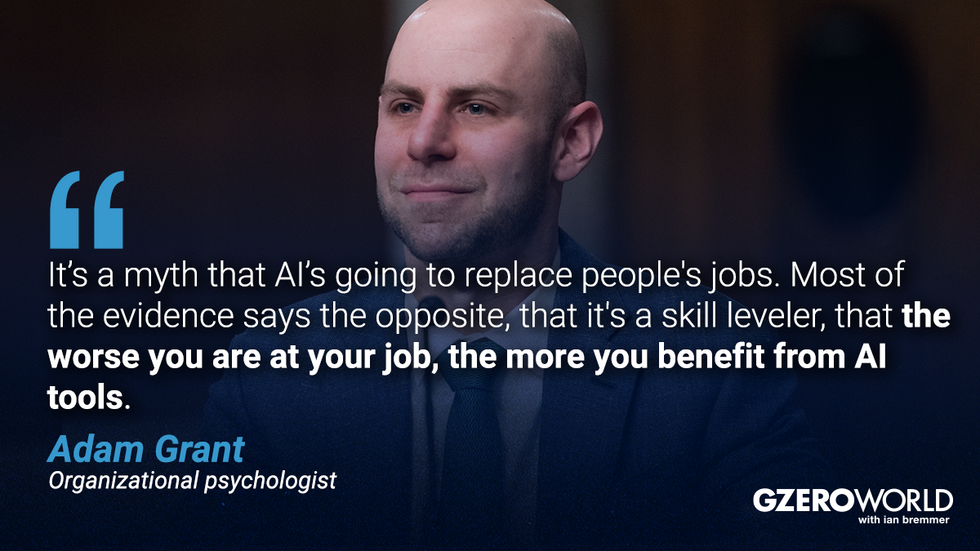
Aired on February 2, 2024
The AI revolution is coming… fast. But what does that mean for your job? Watch Ian Bremmer’s conversation with organizational psychologist Adam Grant.Yuval Noah Harari explains why the world isn't fair (but could be)
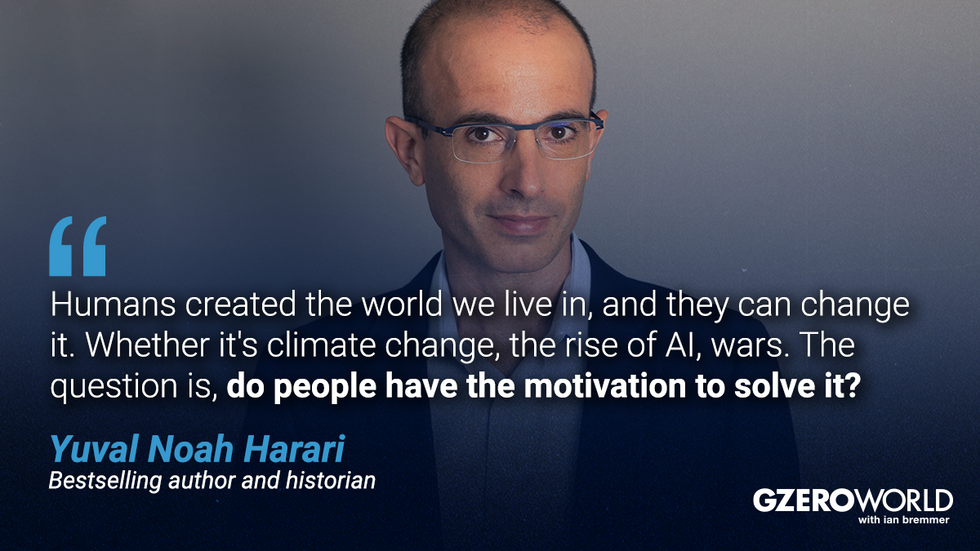
Aired on March 8, 2024
In a conversation filmed live at the historic 92nd Street Y in NYC, Yuval Noah Harari delves into the foundational role of storytelling in human civilization, the existential challenges posed by artificial intelligence, the geopolitical implications of the Ukraine war, and the most pressing questions of the Israeli-Palestinian conflict. Watch the full episode.Thomas L. Friedman on How the Israel-Gaza war could end - if Netanyahu wants it to
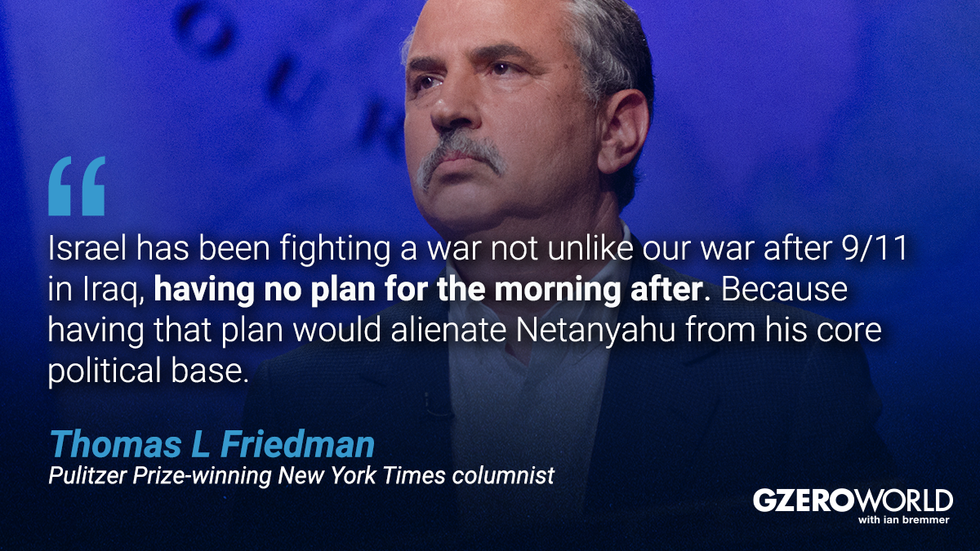
Aired on April 5, 2024
Pulitzer-prize-winning author and New York Times columnist Thomas L. Friedman games out a possible resolution to the war in Gaza and explains why both Israeli Prime Minister Netanyahu and Hamas are obstacles to peace. Watch the full episode.
Emily Bazelon on the major Supreme Court decisions of June 2024
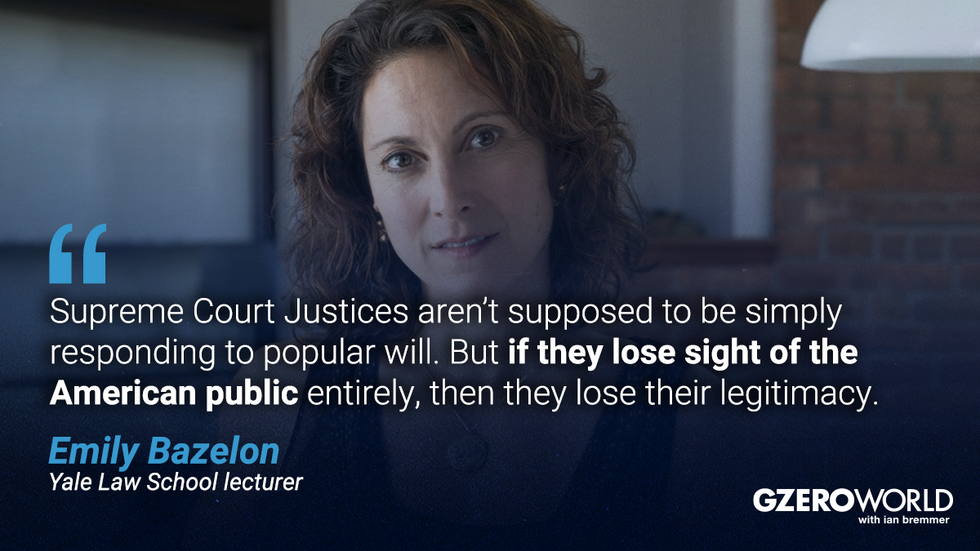
Aired on May 3, 2024
Yale legal scholar and New York Times Magazine staff writer Emily Bazelon unpacks some of the biggest cases that were on the docket this year and how the rulings will impact Americans. Watch the full episode.
Justice & peace in Gaza: The UN Palestinian ambassador's perspective with Riyad Mansour
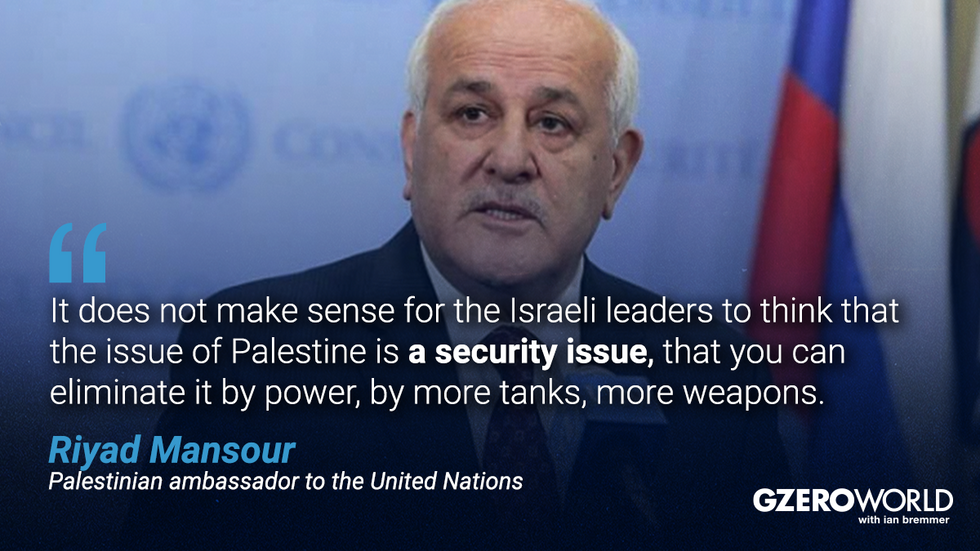
Aired on July 5, 2024
Ian Bremmer sits down with Palestinian Ambassador to the United Nations Riyad Mansour for a candid interview about his role in the UN, the war in Gaza, and how it might end. Watch the full episode.
An exclusive interview with Argentina's radical new president, Javier Milei
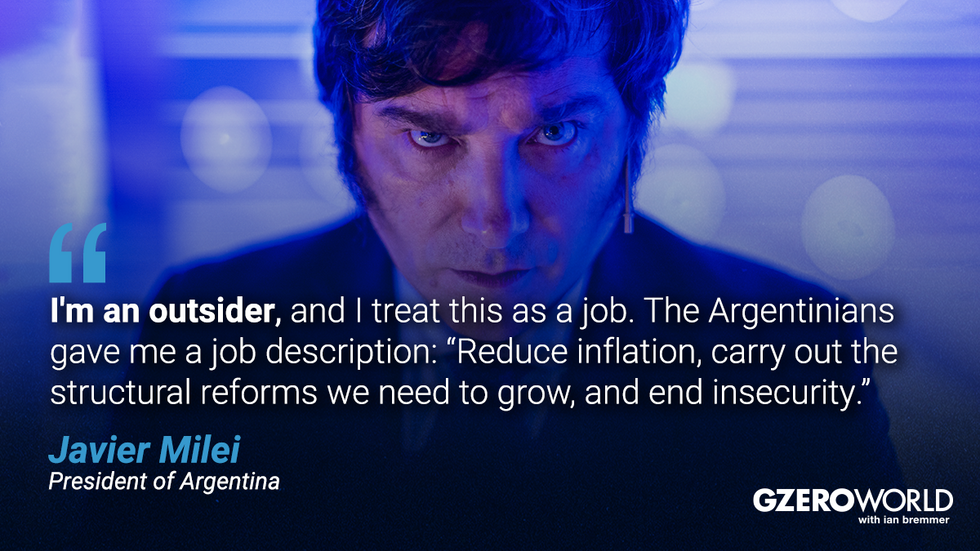
Aired on August 2, 2024
Argentine President Javier Milei defends his radical approach to saving Argentina’s struggling economy, his commitment to aligning with liberal democracies, and his pragmatic stance on international trade and alliances. Watch the full interview.
Why António Guterres believes the UN should lead on AI
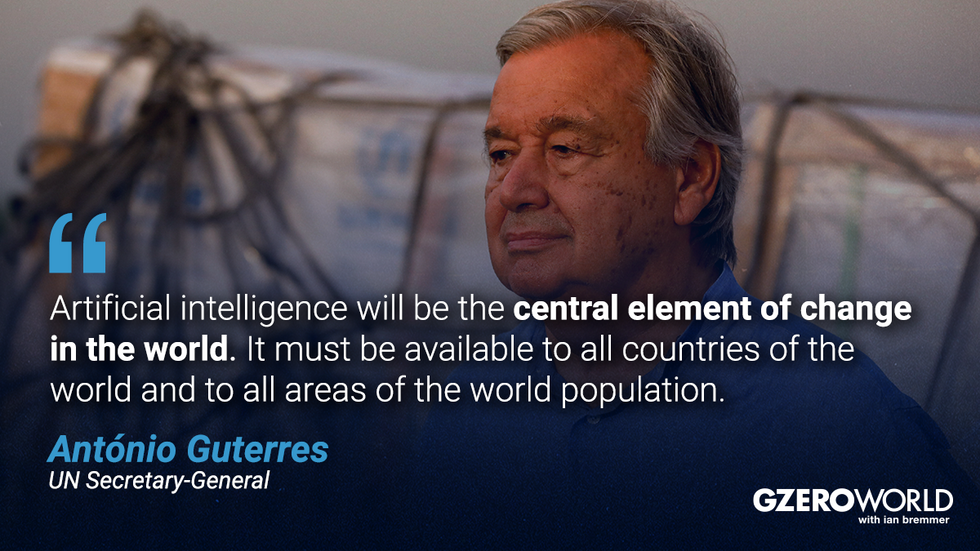
Aired on September 20, 2024
In an exclusive interview for GZERO World, United Nations Secretary-General António Guterres sat with Ian Bremmer on the sidelines of the UN General Assembly to discuss his vision for the future of the UN during his last term in office. Watch the full interview.
Iran's next move: Interview with VP Javad Zarif
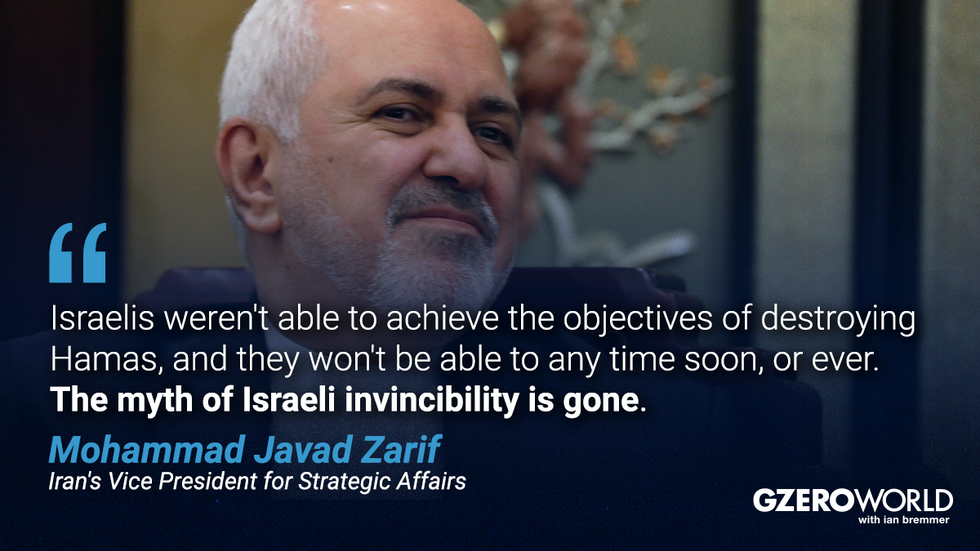
Aired on October 4, 2024
Ian Bremmer sits down with Iran's new Vice President for Strategic Affairs Mohammad Javad Zarif just days before the assassination of Hezbollah leader Hassan Nasrallah to discuss the escalating conflict in the Middle East and where Iran stands. Watch the full episode.
Roberta Metsola on whether Europe can become a global superpower
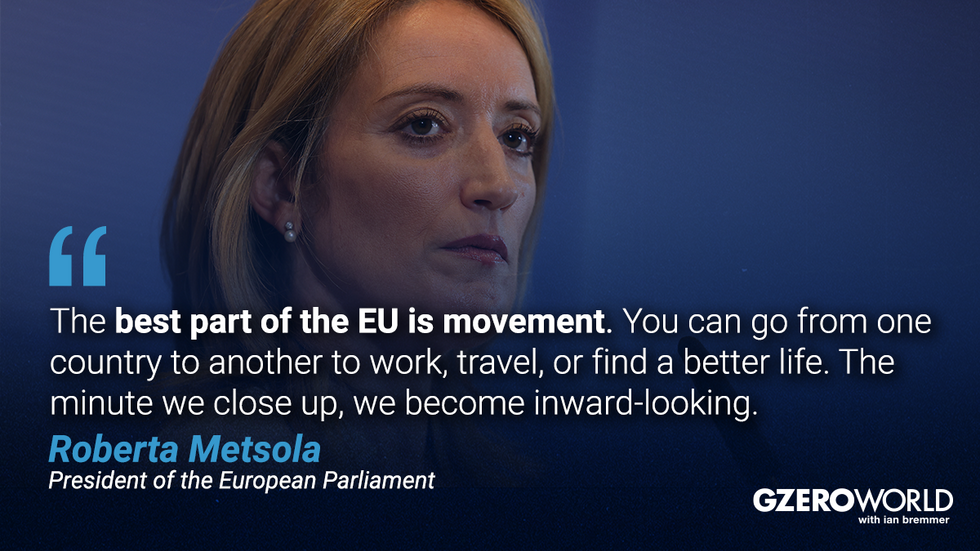
Aired on October 20, 2024
European Parliament President Roberta Metsola discusses Europe’s future amid an ongoing migrant crisis, the war in Ukraine, and an economic slowdown. Can the bloc’s 27 member states stay united? Watch the full episode.
Oren Cass on the case for Trump's tariffs
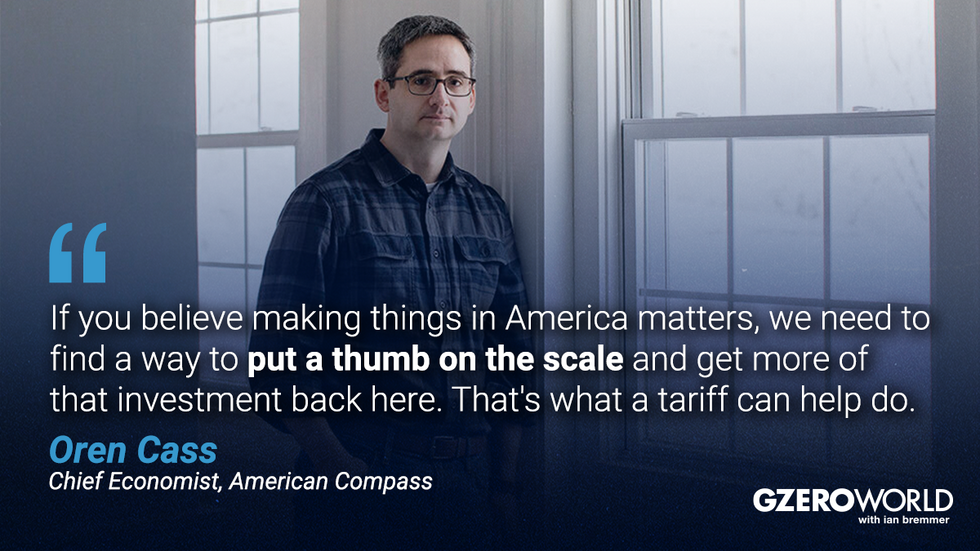
Aired on December 6, 2024
Trump has vowed to raise tariffs, slash business regulation, and deport millions of undocumented immigrants, policies he says will put Americans first. Oren Cass outlines what that will mean practically for workers and consumers. Watch the full episode.
Don’t miss an episode in 2025!
GZERO World airs nationwide on US public television (check local listings), and new digital episodes of GZERO World are released every Monday on YouTube.
Ambassador Robert Wood of the US raises his hand to vote against the ceasefire resolution at the United Nations Security Council, on November 20, 2024.
US vetoes Gaza ceasefire resolution
US vetoes Gaza ceasefire resolution
The US on Wednesday cast the lone veto to sink a UN Security Council resolution calling for an immediate, unconditional ceasefire between Israel and Hamas.
Washington said it opposed the measure because of wording that would have allowed Hamas to wait until after a ceasefire to release the roughly 100 remaining hostages that it still holds in Gaza. This is the fourth time the United States has blocked a ceasefire resolution of this kind.
The draft also called for Palestinian civilians in Gaza to be allowed to return to their homes, for the unhindered delivery of humanitarian aid to the strip, and for a complete withdrawal of Israeli forces.
The resolution’s failure comes as the humanitarian situation in Gaza continues to worsen. Earlier this week, unknown armed men looted roughly 100 trucks in a humanitarian convoy, causing food prices in the already-starving enclave to soar. The UN estimates only 16% of the 1.7 million people in central and southern Gaza have received adequate food rations.
Last week a 30 day ultimatum ran out for Israel to improve humanitarian access to the Strip or risk losing some US arms transfers. Washington said Israel had done the bare minimum to satisfy its concerns.



